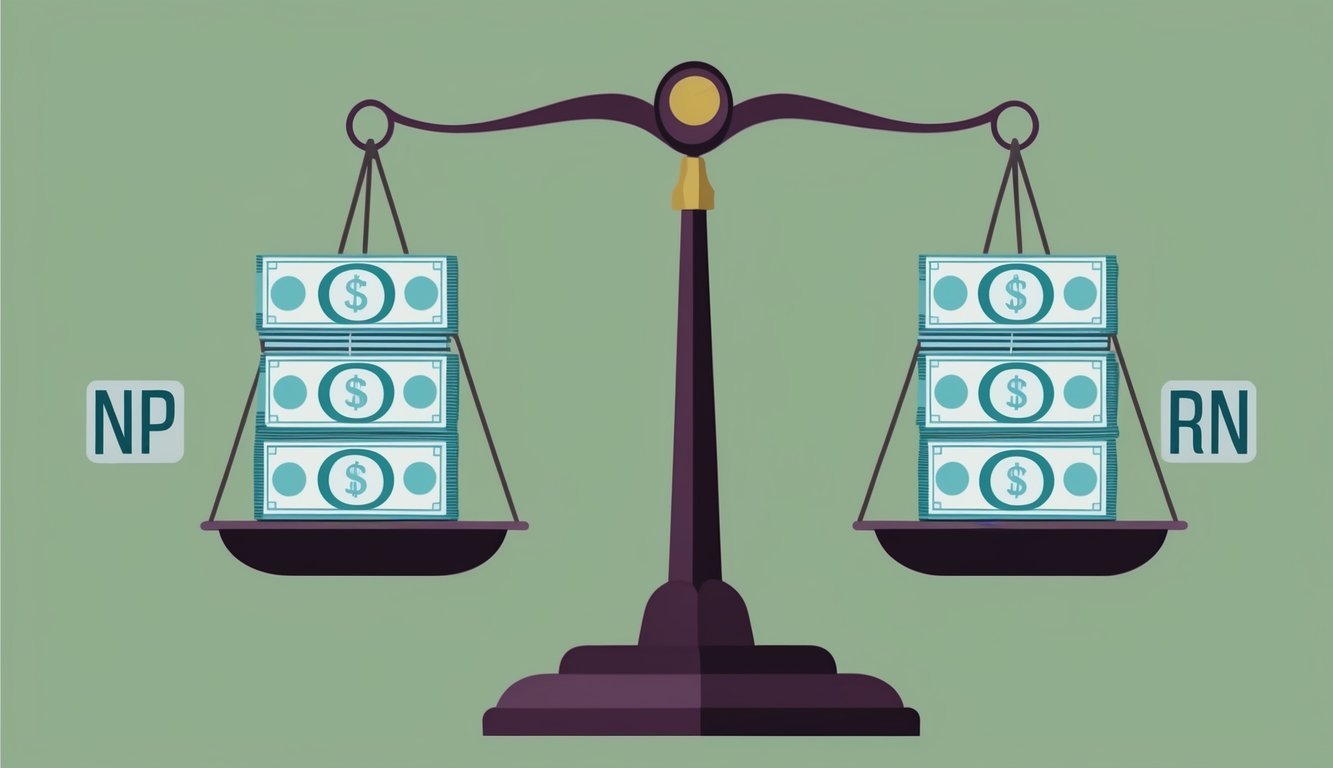The nursing field offers diverse career paths.
Understanding the salary differences between a nurse practitioner (NP) and a registered nurse (RN) can help you make informed decisions about your future. On average, nurse practitioners earn significantly more than registered nurses.
NPs make about $34,010 more per year. This difference arises from various factors, including advanced education, scope of practice, and the specific clinical responsibilities each role entails.
In today’s healthcare landscape, the demand for nurse practitioners is growing.
As you weigh your options, consider the educational requirements and licensure needed to pursue either path.
Both roles provide essential care, but the level of training and autonomy will impact your earning potential and career satisfaction.
Understanding the financial rewards of each position is crucial for anyone considering a career in nursing.
With the right information, you can choose a path that aligns with your goals and financial needs.
Key Takeaways
- Nurse practitioners typically earn higher salaries than registered nurses.
- Educational requirements for NPs involve more advanced degrees and training.
- The job market for both roles is strong, with ongoing demand for skilled professionals.
Educational Pathways and Licensure Requirements

Understanding the educational pathways and licensure requirements is essential for anyone considering a career as a Nurse Practitioner (NP) or Registered Nurse (RN).
Each role has distinct educational requirements and steps needed for certification and licensure.
Nurse Practitioner Education
To become a Nurse Practitioner, you typically start as a Registered Nurse.
Your educational journey must include earning a Master of Science in Nursing (MSN) or a Doctor of Nursing Practice (DNP).
- MSN Programs: These programs usually take 2-3 years to complete and include advanced clinical training.
- DNP Programs: These are more extensive and can take 3-4 years. DNP programs focus on leadership and clinical practice.
It’s crucial that you enroll in accredited programs recognized by the Accreditation Commission for Education in Nursing or the Commission on Collegiate Nursing Education.
After completing your degree, you will need to pass a certification exam specific to your NP specialty.
Registered Nurse Education
Becoming a Registered Nurse involves completing an educational program, which can be one of the following:
- Associate’s Degree in Nursing (ADN): This usually takes 2 years and focuses on foundational nursing skills.
- Bachelor of Science in Nursing (BSN): A BSN takes 4 years and provides more comprehensive training in nursing and healthcare.
Both ADN and BSN programs must be accredited.
After completing your degree, the next step is passing the National Council Licensure Examination for Registered Nurses (NCLEX-RN) to obtain your RN license.
Certification and Licensure
Once you complete your education, you must obtain certification and licensure for both roles.
-
For Nurse Practitioners: After earning your MSN or DNP and completing clinical hours, you will take a certification exam in your specialty area. This could be family practice, pediatrics, or another field.
-
For Registered Nurses: You need to pass the NCLEX-RN. This exam tests your knowledge and skills to ensure you are prepared to practice safely.
Licensure requirements can vary by state, so it’s essential to check your local regulations.
Links to helpful resources can guide you through this process.
Scope of Practice and Clinical Responsibilities
Understanding the scope of practice for Nurse Practitioners (NPs) and Registered Nurses (RNs) is essential for grasping their clinical roles.
Each profession has distinct responsibilities that impact patient care, treatment plans, and overall healthcare delivery.
Nurse Practitioner Clinical Roles
Nurse Practitioners hold an advanced practice role.
They can perform a range of clinical tasks.
These include:
- Prescribing Medications: NPs have the authority to prescribe medications based on their assessments.
- Diagnosing Conditions: They can conduct examinations and diagnose various health issues.
- Developing Treatment Plans: NPs create comprehensive care plans that address patient needs.
In addition to these responsibilities, NPs often perform procedures like suturing wounds or administering vaccines.
Their education prepares them to interpret diagnostic tests and coordinate care.
This ensures they can provide direct patient care while addressing complex medical issues.
Registered Nurse Clinical Roles
Registered Nurses play a critical role in patient care.
While they work under doctors, their responsibilities are vital.
Key duties include:
- Administering Medications: RNs provide prescribed medications and monitor patients for reactions.
- Assessing Patient Conditions: They regularly check vital signs and report changes to the healthcare team.
- Educating Patients: RNs instruct patients on managing their health conditions and medications.
The hands-on care provided by RNs is crucial in hospitals and clinics.
They contribute to creating care plans that prioritize patient safety and comfort.
RNs also gather patient histories, aiding in more informed decisions for future care.
Specializations and Advanced Roles
Both NPs and RNs can specialize in areas that enhance patient care.
Specialties might include:
- Pediatrics
- Geriatrics
- Oncology
- Cardiology
These specializations require additional training and focus within their practice scope.
For example, a Nurse Practitioner in pediatrics would be adept at addressing the unique needs of children.
Overall, these advanced roles allow for targeted and effective patient care tailored to specific populations.
You can learn more about these roles through resources like RN Careers and Nurse.com.
Salary Comparisons and Factors Influencing Earnings
Understanding salary differences between nurse practitioners (NPs) and registered nurses (RNs) is essential.
Several elements, including specialty, experience, and location, play a crucial role in determining your earning potential.
Determinants of Salary
Various factors affect the salaries of NPs and RNs.
Key determinants include:
- Experience: More years in the field often result in higher salaries. Entry-level positions typically earn less, while experienced professionals command significantly more.
- Education: RNs with a bachelor’s degree may earn more than those with an associate degree. NPs usually need advanced degrees, enabling them to earn higher salaries.
- Certification and Specialization: Advanced certifications or specialties can enhance earning potential. For example, critical care NPs often make more than those in primary care.
In 2023, the median salary for RNs was about $126,260, while NPs earned a median salary of $128,490.
Earning Potential Across Specialties
Your earning potential can vary widely based on your area of specialization.
Here’s a quick comparison of average NP salaries by specialty:
| Specialty | Average Salary |
|---|---|
| Hospital Inpatient Care | $139,000 |
| Family Medicine | $110,920 |
| School/University | $106,250 |
As shown, NPs in hospital settings tend to earn more than those in educational settings.
For RNs, salaries can also change based on the unit or department you work in, with those in specialized areas like oncology earning significantly more than those in general practice.
Geographical Wage Variations
Location significantly impacts salaries for both NPs and RNs.
Certain states offer higher average salaries due to factors like the cost of living, demand for healthcare professionals, and state funding.
Here are some average salaries in 2023 by state:
| State | NP Average Salary | RN Average Salary |
|---|---|---|
| California | $140,000 | $136,500 |
| Texas | $120,000 | $80,000 |
| New York | $138,000 | $100,000 |
Research by the Bureau of Labor Statistics shows that urban areas tend to pay higher than rural ones, primarily due to higher demand and living costs.
Job Market Outlook and Opportunities

The job market for nurse practitioners (NPs) and registered nurses (RNs) shows promising growth, driven by the aging population and increasing healthcare needs.
Understanding employment trends, career advancement options, and the impact of healthcare policies can help you navigate your nursing career effectively.
Employment Trends for NPs and RNs
Job outlook data indicates significant growth for both NPs and RNs.
According to the Bureau of Labor Statistics, employment of RNs is projected to grow by 6% from 2023 to 2033, which is faster than the average for all occupations.
For NPs, the growth is even more robust, with projections estimating an increase of 24% over the same period.
This uptick is primarily due to the increasing demand for healthcare services, especially in outpatient care centers.
As more healthcare shifts to outpatient settings, NPs are becoming essential in providing primary and specialized care.
The healthcare team needs skilled professionals to meet these rising demands.
Career Advancement and Specialization
Both NPs and RNs have many opportunities for career advancement.
RNs can pursue certifications and specializations in areas like critical care or pediatrics, often leading to higher salaries and improved job security.
For example, RNs with specializations may earn significantly more than their peers with general practice roles.
For NPs, advancement typically involves further education like obtaining a Doctor of Nursing Practice (DNP) or specialized certifications.
Areas such as family health, geriatrics, and mental health are popular choices.
NPs in specialized roles often enjoy greater job satisfaction and are in high demand, further enhancing their career prospects.
Impact of Healthcare Policies on Employment
Healthcare policies significantly influence the job market for NPs and RNs.
Recent reforms aim to make healthcare more accessible, leading to increased patient volumes in various healthcare settings.
This surge necessitates hiring more nursing professionals.
Changes in scope-of-practice laws also affect employment.
Many states are expanding the roles of NPs, allowing them to function more independently.
This shift enables NPs to fill gaps in underserved areas, which can further improve job opportunities.
Professional Development and Continued Education
As you advance in your nursing career, ongoing education and professional development are crucial.
These opportunities help you stay updated with the latest practices and enhance your skills, whether you are a Nurse Practitioner or a Registered Nurse.
Lifelong Learning for Nurse Practitioners
Lifelong learning is essential for Nurse Practitioners (NPs).
NPs need to fulfill continuing education (CE) requirements to maintain their licenses.
Typically, they need minimum CEUs that can include:
- Advanced practice courses
- Leadership training
- Clinical skills refreshers
Many NPs pursue a Doctor of Nursing Practice (DNP).
This program emphasizes leadership and evidence-based practice.
NPs can also enroll in specialized nursing programs to refine their skills further.
With advanced education, you can improve patient outcomes and expand your career options.
Career Progression for Registered Nurses
Registered Nurses (RNs) can enhance their careers through continuing education and qualifications.
You may consider pursuing a Bachelor of Science in Nursing (BSN) if you haven’t already.
The shift towards BSN-prepared nurses is growing, making this degree valuable.
Registered Nurses can also seek advanced degrees, like a Master’s Degree in Nursing (MSN).
With an MSN, you can specialize in fields such as:
- Nurse education
- Nurse leadership
- Clinical practice
Additional certifications in areas like critical care or geriatrics can also lead to better job prospects and higher salaries.
Requirements for Recertification
Recertification requirements vary based on your nursing role and state.
Generally, NPs and RNs must complete a specific number of CEUs.
For example, many states require NPs to complete about 30 hours of continuing education every two years.
You should consult your state’s board of nursing for details on requirements.
Additionally, staying updated with organizations like the American Nurses Credentialing Center (ANCC) ensures you meet the necessary standards for practice and maintain certification.
Frequently Asked Questions

This section addresses common questions about the salary differences between Nurse Practitioners (NPs) and Registered Nurses (RNs).
You will find specific details about salary ranges, regional variations, hourly pay rates, and factors affecting these differences.
What are the salary differences between Nurse Practitioners and Registered Nurses?
The average salary for Nurse Practitioners is significantly higher than that for Registered Nurses.
According to the U.S. Bureau of Labor Statistics, Nurse Practitioners earn around $115,800 per year, while Registered Nurses earn about $77,600 annually.
How do NP salaries compare to RN salaries by state or region?
Salaries for both NPs and RNs can vary widely depending on the state or region.
For example, NPs in California often earn more, while those in rural areas may have lower average salaries.
Research specific state salary data for the most accurate insights.
What is the hourly pay disparity between NPs and RNs?
Hourly wages also reflect the salary differences.
Nurse Practitioners typically earn approximately $55 to $65 per hour.
In contrast, Registered Nurses earn around $37 to $45 per hour.
This shows a clear wage gap based on job responsibilities and education.
Do Nurse Practitioners earn more than Registered Nurses?
Yes, Nurse Practitioners generally earn more than Registered Nurses due to their advanced education and greater scope of practice.
This difference in pay reflects the additional responsibilities that NPs take on, including diagnosing conditions and prescribing medications.
What factors contribute to the salary variations between NPs and RNs?
Several factors affect salary differences between NPs and RNs.
These include education level, years of experience, certification, and place of employment, such as hospitals or private practices.
Geographic location also plays a critical role in salary evaluation.
How does the level of education impact salaries for Nurse Practitioners and Registered Nurses?
Education significantly impacts salary levels.
Nurse Practitioners typically hold a Master of Science in Nursing (MSN) or a Doctor of Nursing Practice (DNP).
Registered Nurses usually have an Associate’s Degree in Nursing (ADN) or a Bachelor’s Degree in Nursing (BSN).
Higher education often leads to better pay and advanced opportunities.
For more detailed salary information, you can visit Nurse.org or Incredible Health.

